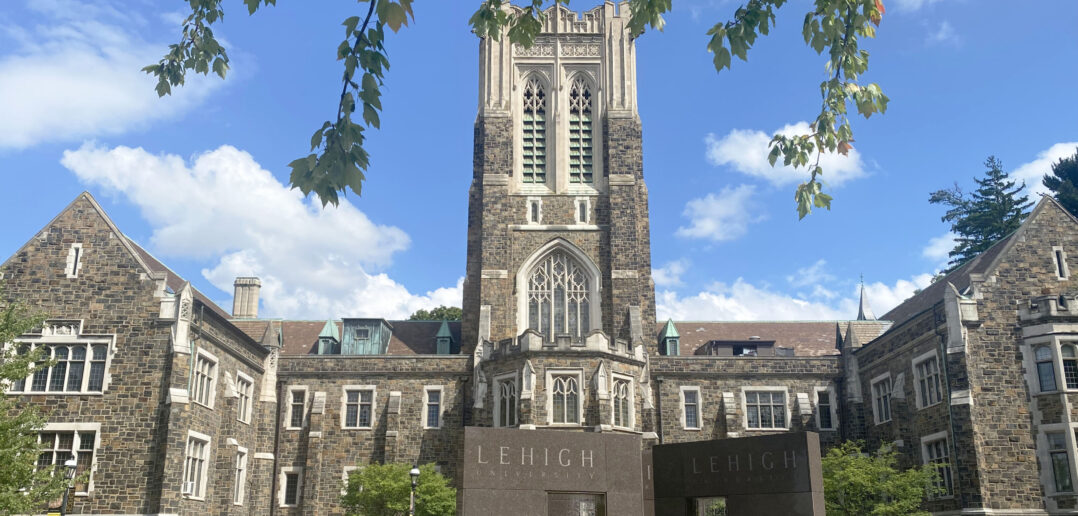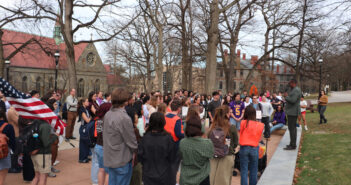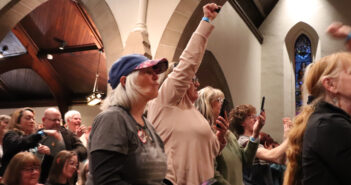Founded in 1865 by Asa Packer, Lehigh was originally an all male, all white university focused on engineers. It wasn’t until 1901 that the first Chinese graduate from Lehigh, Te-Ching Strong Yen, graduated, and in 1956, the first (and only at the time) African-American Lehigh graduate, Costel Denson, graduated.
In 1970, the Lehigh Board of Trustees voted to accept female undergraduate students for the first time. The class of 1976 included 169 female undergraduates, making them the first class at Lehigh to have female students.
Although great strides have been made since its founding, students from marginalized backgrounds may not feel represented or able to fit in.
Lehigh instated the Office of Diversity, Equity and Inclusion (ODI&E) in 2017 to ensure they have appropriate resources and plans to create a diverse student body and be able to support them.
The office sent out a survey to Lehigh’s student body, with 1% of the student body responses in order to determine the effectiveness of the office and the effectiveness of their efforts by seeing if they had an impact on student life. The survey polled where students were from demographically, their race/ethnicity, religion, gender and what Lehigh college they were enrolled in.
In a different survey conducted by Lehigh journalism students, individuals gave their opinions on varying aspects of Lehigh’s community and diversity on a scale from 1 to 10, with 1 being the lowest, and 10 being the highest. This survey asked students whether they felt represented by their race amongst the student body, and whether or not they felt their professors supported their different experiences in relation to their identities. It was found that although Lehigh is not extremely diverse racially or ethnically, a majority of students felt represented within their Lehigh college.
Christine Lake, the administrative director for the ODI&E, oversees the office’s budget and the university’s administrative process for the university’s advocacy centers. While having experience within this field, she is committed to creating a more inclusive Lehigh.
Lake said in 2018, the ODI&E created the Center for Student Access and Success (SAS) with the primary focus of the center to offer resources and support to Lehigh students, with an emphasis on first-generation students and those with a limited income.
With efforts made by the SAS, the office of Multicultural Affairs, Center for Gender Equity, and others, Lehigh was awarded with the Higher Education Excellence in Diversity (HEED) award for the fifth consecutive year by Insight into Diversity, a magazine focused on the advancements made on diversity within higher education for the last five years.
“It’s the journey, not the destination,” Lake said. “You’re never going to hit the end, there’s never going to be an end to this work. There’s always going to be another group that you want to consider, and other ways that you want to think about making a campus a diverse environment for students.”
Within Lehigh, the colleges themselves also prioritize the well-being and support of their students, especially first years, through administrative offices and academic advisors.
“Student connections are what make this place really special, so I think fostering that from the beginning is really important,” said Kelly Austin, the associate dean of the College of Arts and Sciences and professor of sociology and global studies.
The College of Arts and Sciences also has systems put into place for students who might be struggling on campus academically, socially or in their transition to Lehigh.
“We work really closely to promote early warning systems among our faculty so that we can be alerted if students are maybe facing some challenges,” Austin said. “Academically, there’s a lot of really great resources, like the Center for Academic Success, that provide tutoring and other programs to support students academically. Our office works to point students to these resources and we train our CAS advisors to do so as well.”
Austin, along with other Lehigh CAS advisors, have experience working with students personally to help them feel more comfortable at Lehigh.
“When students come to me and say they are having trouble finding their social fit, I might reassure them in various ways to give them confidence to find their own home at Lehigh and help them see there are a lot of different social circles at Lehigh,” Austin said.
However, as much good Lehigh has done to create a more inclusive community, there is no real end to the work involved with diversifying a historically white, cis-gendered, male institution. While their efforts have been recognized, Lehigh still has cracks within their system that ultimately trickle down to a student’s quality of life and future at Lehigh.
From the results of the student survey conducted, results show that many students felt as though they did not feel they belonged amongst faculty and professors compared to their peers.
Christopher Blake, a former computer science major within the P.C. Rossin College of Engineering and Applied Sciences, attended Lehigh during the 2021-2022 academic year. He said he did not feel represented or cared for during his time at Lehigh.
“In terms of the entire school, no,” Blake said. “But, I do feel like I was able to find a community there where I could connect with people that were like me, even though I didn’t feel as though I was fully represented by the school.”
Even with a sense of community, support systems consisting of faculty and staff, and other resources that Lehigh makes available to students, Blake said that he felt as though he was alone while dealing with his issues as a student of color at Lehigh.
“I feel like I only had one professor that genuinely cared about my emotional well-being,” Blake said.
Blake, a Trinidadian-Jamaican from Brooklyn, New York, said he felt this way because he was a part of such a small demographic at a predominantly white institution, in a white-dominated department.
Ultimately, these factors led to his decision to withdraw from Lehigh and become a salesman back at home.
Data from Lehigh’s Office of Institutional Data (OID) shows that there were only 65 students who identified as Black or African American within the P.C. Rossin College of Engineering and Applied Sciences, which is made up of 1,350 students.
Lehigh students also expressed concerns with the university’s diversity efforts within the survey when asked what they felt their college and Lehigh as a whole were lacking and needed areas of improvement.
“Diversity, Equity & Inclusion education initiatives (need improvement or are lacking in areas),” an anonymous student on the survey said. “I feel as though people of color often find themselves having to teach their classmates about the general implications of being a person of their background in the U.S.”
Lehigh students feel DEI efforts could be strengthened across campus amidst professor and student relationships as well.
“Some professors in the engineering school could be more understanding of sexual or cultural differences,” said another anonymous student from the survey.
Advancements towards a more inclusive racial climate continue to be made by University Colleges and DEI offices; however, their work is never done, as there are always more cracks to fill to make a better Lehigh.






Comment policy
Comments posted to The Brown and White website are reviewed by a moderator before being approved. Incendiary speech or harassing language, including comments targeted at individuals, may be deemed unacceptable and not published. Spam and other soliciting will also be declined.
The Brown and White also reserves the right to not publish entirely anonymous comments.